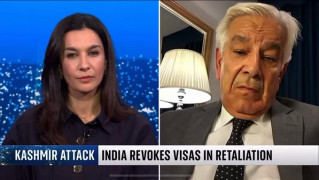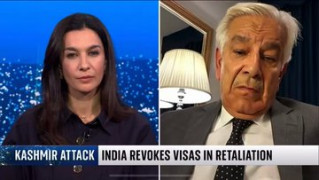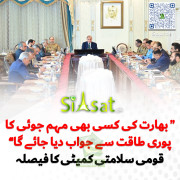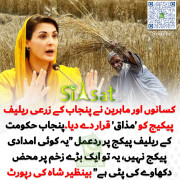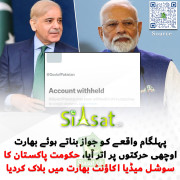Pakistani1947
Chief Minister (5k+ posts)

مسلم امّت میں شیطان نے غلط فہمی پیدا کر دی ہے کہ وہ شرک سے پاک ہے یعنی وہ شرک نہیں کر سکتی - اس غلط فہمی کی بنا پر یہ امّت شرک کے نت نئے طریقوں کو رائج کرنے میں مصروف ہے جبکہ شرک اس قدر عظیم گناہ ہے کہ الله تعالیٰ قرآن میں فرماتا ہے
(Qur'an 6:82) الَّذِينَ آمَنُوا وَلَمْ يَلْبِسُوا إِيمَانَهُم بِظُلْمٍ أُولَـٰئِكَ لَهُمُ الْأَمْنُ وَهُم مُّهْتَدُونَ
جو لوگ ایمان لائے اور انہوں نے اپنے ایمان میں شرک نہیں ملایا امن انہیں کے لیے ہے اور وہی راہ راست پر ہیں
اس کا شان نزول صحیح مسلم اور صحیح بخاری کی حدیث میں بیان کیا گیا ہے
عبد اللہ بن ادریس ، ابو معاویہ اور وکیع نے اعمش سے حدیث سنائی ، انہوں نے ابراہیم سے ، انہوں نے علقمہ سے اورانہوں نے حضرت عبد اللہ رضی اللہ عنہ سے روایت کی کہ جب یہ آیت اتری : ’’ جولوگ ایمان لائے اور انہوں نے اپنے ایمان کے ساتھ ظلم کی آمیزش نہیں کی ۔ ‘ ‘ تو رسول اللہ ﷺ کے صحابہ پر یہ آیت گراں گزری اور انہوں نے گزارش کی : ہم میں سے کون ہے جو اپنے نفس پر ظلم نہ کرتا ہو ؟ تو رسول اللہ ﷺ نے فرمایا : ’’اس آیت کا مطلب وہ نہیں جو تم سمجھتے ہو ۔ ظلم وہ ہے جس طرح لقمان نے اپنے بیٹے سے کہا تھا : ’’ اے بیٹے! اللہ کےساتھ شرک نہ کرنا ، شرک یقیناً بہت بڑا ظلم ہے ۔ ‘ ‘
Sahih Muslim - 327 - islam360
(Qur'an 31:13) وَإِذْ قَالَ لُقْمَانُ لِابْنِهِ وَهُوَ يَعِظُهُ يَا بُنَيَّ لَا تُشْرِكْ بِاللَّهِ ۖ إِنَّ الشِّرْكَ لَظُلْمٌ عَظِيمٌ
اور جب لقمان نے اپنے بیٹے کو نصیحت کرتے ہوئے کہا تھا کہ بیٹا الله کے ساتھ کسی کو شریک نہ ٹھہرانا بے شک شرک کرنا بڑا بھاری ظلم ہے
اگر یہ عقیدہ رکھا جائے کہ امّت شرک نہیں کر سکتی تو نیچے بیان کی گئی حدیث میں یہ کیوں کہا گیا کہ کسی مسلمان کے جنا زے پر چالیس آدمی شامل ہو جاتے ہیں کہ شرک نہیں کرتے تو اللہ تعا لیٰ ان کی سفارش کو قبول فر ما لیتا ہے- اس حدیث سے ثابت ہوتا ہے کہ امّت میں ایسے لوگ ہونگے جو کہ شرک کرینگے
ہارون بن معروف، ہارون بن سعید ایلی اور ولید بن شجاع میں سے ولید نے کہا : مجھے حدیث سنا ئی اور دوسرے دو نوں نے کہا : ہمیں حدیث سنا ئی ابن وہب نے انھوں نے کہا : مجھے ابو صخر نے شر یک بن عبد اللہ بن ابی نمر سے خبر دی انھوں نے حضرت ابن عباس رضی اللہ تعالیٰ عنہما کے آزاد کردہ غلا م کریب سے اور انھوں نے حضرت عبد اللہ بن عبا س رضی اللہ تعالیٰ عنہما سے روا یت کی کہ قدید یا عسفان میں ان کے ایک بیٹے کا انتقال ہو گیا تو انھوں نے کہا : کریب !دیکھو اس کے ( جنازے کے ) لیے کتنے لو گ جمع ہو چکے ہیں ۔ میں با ہر نکلا تو دیکھا کہ اس کی خا طر ( خاصے ) لو گ جمع ہو چکے ہیں تو میں نے ان کو اطلا ع دی ۔ انھوں نے پو چھا تو کہتے ہو کہ وہ چا لیس ہوں گے ؟ انھوں نے جواب دیا : ہاں ۔ تو انھوں نے فر ما یا : اس ( میت ) کو ( گھر سے ) باہر نکالو کیونکہ میں نے رسول اللہ صلی اللہ علیہ وسلم کو یہ فر ما تے ہو ئے سنا ہے : جو بھی مسلمان فوت ہو جا تا ہے اور اس کے جنا زے پر ( ایسے ) چالیس آدمی ( نماز ادا کرنے کے لیے ) کھڑے ہو جا تے ہیں جو اللہ کے ساتھ کسی چیز کو شریک نہیں ٹھہر اتے تو اللہ تعا لیٰ اس کے بارے میں ان کی سفارش کو قبول فر ما لیتا ہے ۔
Sahih Muslim – 2199 - Islam360
نیچے بخاری اور مسلم کی متفقہ حدیث بیان کی جا رہی ہے
نبی کریم صلی اللہ علیہ وسلم نے فرمایا ”تم اپنے سے پہلی امتوں کی ایک ایک بالشت اور ایک ایک گز میں اتباع کرو گے، یہاں تک کہ اگر وہ کسی گوہ کے سوراخ میں داخل ہوئے ہوں گے تو تم اس میں بھی ان کی اتباع کرو گے۔“ ہم نے پوچھا: یا رسول اللہ! کیا یہود و نصاریٰ مراد ہیں؟ فرمایا پھر اور کون۔
Sahih Bukhari - 7320 - Islam360
اوپر بیان کی گئی حدیث کے الفاظ کس موقع پر رسول اللہ نے کہے تھے وہ نیچے بیان کی گئی حدیث سے واضح ہو جاۓ گا کہ پچھلی حدیث عیسائ اور یہود کی پیروی دنیاوی معملات میں نہیں بلکہ دینوی معملات میں کرنے کی پیش گوئی کی گئی ہے
جب رسول اللہ صلی اللہ علیہ وسلم حنین کے لیے نکلے تو آپ کا گزر مشرکین کے ایک درخت کے پاس سے ہوا جسے ذات انواط کہا جاتا تھا، اس درخت پر مشرکین اپنے ہتھیار لٹکاتے تھے ۱؎، صحابہ نے عرض کیا: اللہ کے رسول! ہمارے لیے بھی ایک ذات انواط مقرر فرما دیجئیے جیسا کہ مشرکین کا ایک ذات انواط ہے، نبی اکرم صلی اللہ علیہ وسلم نے فرمایا: ”سبحان اللہ! یہ تو وہی بات ہے جو موسیٰ علیہ السلام کی قوم نے کہی تھی کہ ہمارے لیے بھی معبود بنا دیجئیے جیسا ان مشرکوں کے لیے ہے، اس ذات کی قسم جس کے ہاتھ میں میری جان ہے! تم گزشتہ امتوں کی پوری پوری پیروی کرو گے“
Jam e Tirmazi – 2180- Islam360
نیچے بیان کی گئی حدیث جس میں جو بات حضور ﷺ نے وفات سے صرف پانچ دن پہلے ارشاد فرمائی تھی اس سے ثابت ہوتا ہے کہ حضور ﷺ فکر تھی کہ ان کی امّت عیسائ اور یہود کی پیروی میں شرک کرے گی
۔ حضرت جندب رضی اللہ عنہ نے کہا : میں نے نبیﷺ کو آپ کی وفات سے پانچ دن پہلے یہ کہتے ہوئے سنا : میں اللہ تعالیٰ کے حضور اس چیز سے براءت کا اظہار کرتا ہوں کہ تم میں سے کوئی میرا خلیل ہو کیونکہ اللہ تعالیٰ نے مجھے اپنا خلیل بنا لیا ہے ، جس طرح اس نے ابراہیم علیہ السلام کو اپنا خلیل بنایا تھا ، اگر میں اپنی امت میں سے کسی کو اپنا خلیل بناتا تو ابو بکر کو خلیل بناتا ، خبردار! تم سے پہلے لوگ اپنے انبیاء اور نیک لوگوں کی قبروں کو سجدہ گاہیں بنا لیا کرتے تھے ، خبردار! تم قبروں کو سجدہ گاہیں نہ بنانا ، میں تم کو اس سے روکتا ہوں ۔
Sahih Muslim - 1188 - Islam360
نیچے بیان کی گئی حدیث اس تمام معاملے کو بلکل واضح کر دے گی کہ حضرت عائشہ رَضِيَ اللَّهُ عَنْهُمَا نے بھی رسول اللہ ﷺ کے فرمان کا یہی مطلب نکالا کہ رسول اللہ ﷺ کی قبر پر شرک ہو سکتا ہے
نبی کریم صلی اللہ علیہ وسلم نے اپنے مرض الموت میں فرمایا کہ اللہ تعالیٰ نے یہودیوں کو اپنی رحمت سے دور کر دیا کہ انہوں نے اپنے انبیاء کی قبروں کو سجدہ گاہ بنا لیا تھا۔ عائشہ رضی اللہ عنہا نے کہا کہ اگر یہ بات نہ ہوتی تو آپ صلی اللہ علیہ وسلم کی قبر بھی کھلی رکھی جاتی لیکن آپ کو یہ خطرہ تھا کہ کہیں آپ کی قبر کو بھی سجدہ نہ کیا جانے لگے۔
Sahih Bukhari – 4441 – islam360
حضرت عائشہ رَضِيَ اللَّهُ عَنْهُمَا کو تو مسلمانوں سے شرک کا ارتکاب کا ڈر تھا - حضرت عائشہ رَضِيَ اللَّهُ عَنْهُمَا یقینآ انڈیا اور پاکستان کے مولویوں سے زیادہ دین کا فہم رکھتی تھیں جو کہ سمجھتے ہیں کہ مسلمان شرک نہیں کر سکتا
رسول اللہ صلی اللہ علیہ وسلم نے فرمایا: ”قیامت اس وقت تک قائم نہیں ہو گی یہاں تک کہ میری امت کے کچھ قبیلے مشرکین سے مل جائیں، اور بتوں کی پرستش کریں، اور میری امت میں عنقریب تیس جھوٹے ( دعویدار ) نکلیں گے، ان میں سے ہر ایک یہ دعویٰ کرے گا کہ وہ نبی ہے، حالانکہ میں خاتم النبین ہوں میرے بعد کوئی ( دوسرا ) نبی نہیں ہو گا“۔
امام ترمذی کہتے ہیں: یہ حدیث حسن صحیح ہے۔
Jam e Tirmazi – 2219 – Islam360
باقی رہا مسئلہ کہ جہالت یا نا سمجھی کی وجہ سے شرک کرنے والے کو رعایت مل سکتی ہے یا نہیں؟ اس کی بابت ہم کچھ نہیں کہہ سکتے،یہ اس کا معاملہ اللہ کے ساتھ ہے،جس کا فیصلہ وہ روز قیامت ہی فرمائے گا۔ مبلغ کی ذمہ داری بلاغ مبین (کھول کر بیان کر دینا) ہے اور اس بلاغ مبین میں یہ بات بھی شامل ہے کہ جو عقیدہ یا عمل جیسا ہے،قرآن و حدیث کی روشنی میں اس کی وضاحت کریں ،اس پر تاویلات کا پردہ نہ ڈالیں اور نہ مصلحت کا نقاب۔وہ حلال ہے یا حرام،سنت ہے یا بدعت،شرک ہے یا توحید؟ہر عمل کی وضاحت مبلغ کا منصبی فریضہ ہے ،تاکہ لوگ حلال کو اختیار کریں ،حرام سے بچیں،سنت پر عمل کریں۔بدعت سے گریز کریں اور شرک سے بچیں اور توحید کا راستہ اپنائیں۔
اگر آپ کو معلوم نہیں کہ سرخ بتی پر روکنا ہے اور آپ کا چالان ہو جاتا ہے تو شکایت نہ کریں کیونکہ یہ جاننا آپ کے ذمہ تھا کہ یہ معلوم کریں کہ سرخ بتی پر رکنا ہے - اللہ تعالیٰ ہم سب کو شرک کے ساۓ سے بھی دور رکھے - آمین
(Qur'an 7:172) وَإِذْ أَخَذَ رَبُّكَ مِن بَنِي آدَمَ مِن ظُهُورِهِمْ ذُرِّيَّتَهُمْ وَأَشْهَدَهُمْ عَلَىٰ أَنفُسِهِمْ أَلَسْتُ بِرَبِّكُمْ ۖ قَالُوا بَلَىٰ ۛ شَهِدْنَا ۛ أَن تَقُولُوا يَوْمَ الْقِيَامَةِ إِنَّا كُنَّا عَنْ هَـٰذَا غَافِلِينَ
When thy Lord drew forth from the Children of Adam - from their loins - their descendants, and made them testify concerning themselves, (saying): "Am I not your Lord (who cherishes and sustains you)?"- They said: "Yea! We do testify!" (This), lest ye should say on the Day of Judgment: "Of this we were never mindful":(Qur'an 6:82) الَّذِينَ آمَنُوا وَلَمْ يَلْبِسُوا إِيمَانَهُم بِظُلْمٍ أُولَـٰئِكَ لَهُمُ الْأَمْنُ وَهُم مُّهْتَدُونَ
جو لوگ ایمان لائے اور انہوں نے اپنے ایمان میں شرک نہیں ملایا امن انہیں کے لیے ہے اور وہی راہ راست پر ہیں
اس کا شان نزول صحیح مسلم اور صحیح بخاری کی حدیث میں بیان کیا گیا ہے
عبد اللہ بن ادریس ، ابو معاویہ اور وکیع نے اعمش سے حدیث سنائی ، انہوں نے ابراہیم سے ، انہوں نے علقمہ سے اورانہوں نے حضرت عبد اللہ رضی اللہ عنہ سے روایت کی کہ جب یہ آیت اتری : ’’ جولوگ ایمان لائے اور انہوں نے اپنے ایمان کے ساتھ ظلم کی آمیزش نہیں کی ۔ ‘ ‘ تو رسول اللہ ﷺ کے صحابہ پر یہ آیت گراں گزری اور انہوں نے گزارش کی : ہم میں سے کون ہے جو اپنے نفس پر ظلم نہ کرتا ہو ؟ تو رسول اللہ ﷺ نے فرمایا : ’’اس آیت کا مطلب وہ نہیں جو تم سمجھتے ہو ۔ ظلم وہ ہے جس طرح لقمان نے اپنے بیٹے سے کہا تھا : ’’ اے بیٹے! اللہ کےساتھ شرک نہ کرنا ، شرک یقیناً بہت بڑا ظلم ہے ۔ ‘ ‘
Sahih Muslim - 327 - islam360
(Qur'an 31:13) وَإِذْ قَالَ لُقْمَانُ لِابْنِهِ وَهُوَ يَعِظُهُ يَا بُنَيَّ لَا تُشْرِكْ بِاللَّهِ ۖ إِنَّ الشِّرْكَ لَظُلْمٌ عَظِيمٌ
اور جب لقمان نے اپنے بیٹے کو نصیحت کرتے ہوئے کہا تھا کہ بیٹا الله کے ساتھ کسی کو شریک نہ ٹھہرانا بے شک شرک کرنا بڑا بھاری ظلم ہے
اگر یہ عقیدہ رکھا جائے کہ امّت شرک نہیں کر سکتی تو نیچے بیان کی گئی حدیث میں یہ کیوں کہا گیا کہ کسی مسلمان کے جنا زے پر چالیس آدمی شامل ہو جاتے ہیں کہ شرک نہیں کرتے تو اللہ تعا لیٰ ان کی سفارش کو قبول فر ما لیتا ہے- اس حدیث سے ثابت ہوتا ہے کہ امّت میں ایسے لوگ ہونگے جو کہ شرک کرینگے
ہارون بن معروف، ہارون بن سعید ایلی اور ولید بن شجاع میں سے ولید نے کہا : مجھے حدیث سنا ئی اور دوسرے دو نوں نے کہا : ہمیں حدیث سنا ئی ابن وہب نے انھوں نے کہا : مجھے ابو صخر نے شر یک بن عبد اللہ بن ابی نمر سے خبر دی انھوں نے حضرت ابن عباس رضی اللہ تعالیٰ عنہما کے آزاد کردہ غلا م کریب سے اور انھوں نے حضرت عبد اللہ بن عبا س رضی اللہ تعالیٰ عنہما سے روا یت کی کہ قدید یا عسفان میں ان کے ایک بیٹے کا انتقال ہو گیا تو انھوں نے کہا : کریب !دیکھو اس کے ( جنازے کے ) لیے کتنے لو گ جمع ہو چکے ہیں ۔ میں با ہر نکلا تو دیکھا کہ اس کی خا طر ( خاصے ) لو گ جمع ہو چکے ہیں تو میں نے ان کو اطلا ع دی ۔ انھوں نے پو چھا تو کہتے ہو کہ وہ چا لیس ہوں گے ؟ انھوں نے جواب دیا : ہاں ۔ تو انھوں نے فر ما یا : اس ( میت ) کو ( گھر سے ) باہر نکالو کیونکہ میں نے رسول اللہ صلی اللہ علیہ وسلم کو یہ فر ما تے ہو ئے سنا ہے : جو بھی مسلمان فوت ہو جا تا ہے اور اس کے جنا زے پر ( ایسے ) چالیس آدمی ( نماز ادا کرنے کے لیے ) کھڑے ہو جا تے ہیں جو اللہ کے ساتھ کسی چیز کو شریک نہیں ٹھہر اتے تو اللہ تعا لیٰ اس کے بارے میں ان کی سفارش کو قبول فر ما لیتا ہے ۔
Sahih Muslim – 2199 - Islam360
نیچے بخاری اور مسلم کی متفقہ حدیث بیان کی جا رہی ہے
نبی کریم صلی اللہ علیہ وسلم نے فرمایا ”تم اپنے سے پہلی امتوں کی ایک ایک بالشت اور ایک ایک گز میں اتباع کرو گے، یہاں تک کہ اگر وہ کسی گوہ کے سوراخ میں داخل ہوئے ہوں گے تو تم اس میں بھی ان کی اتباع کرو گے۔“ ہم نے پوچھا: یا رسول اللہ! کیا یہود و نصاریٰ مراد ہیں؟ فرمایا پھر اور کون۔
Sahih Bukhari - 7320 - Islam360
اوپر بیان کی گئی حدیث کے الفاظ کس موقع پر رسول اللہ نے کہے تھے وہ نیچے بیان کی گئی حدیث سے واضح ہو جاۓ گا کہ پچھلی حدیث عیسائ اور یہود کی پیروی دنیاوی معملات میں نہیں بلکہ دینوی معملات میں کرنے کی پیش گوئی کی گئی ہے
جب رسول اللہ صلی اللہ علیہ وسلم حنین کے لیے نکلے تو آپ کا گزر مشرکین کے ایک درخت کے پاس سے ہوا جسے ذات انواط کہا جاتا تھا، اس درخت پر مشرکین اپنے ہتھیار لٹکاتے تھے ۱؎، صحابہ نے عرض کیا: اللہ کے رسول! ہمارے لیے بھی ایک ذات انواط مقرر فرما دیجئیے جیسا کہ مشرکین کا ایک ذات انواط ہے، نبی اکرم صلی اللہ علیہ وسلم نے فرمایا: ”سبحان اللہ! یہ تو وہی بات ہے جو موسیٰ علیہ السلام کی قوم نے کہی تھی کہ ہمارے لیے بھی معبود بنا دیجئیے جیسا ان مشرکوں کے لیے ہے، اس ذات کی قسم جس کے ہاتھ میں میری جان ہے! تم گزشتہ امتوں کی پوری پوری پیروی کرو گے“
Jam e Tirmazi – 2180- Islam360
نیچے بیان کی گئی حدیث جس میں جو بات حضور ﷺ نے وفات سے صرف پانچ دن پہلے ارشاد فرمائی تھی اس سے ثابت ہوتا ہے کہ حضور ﷺ فکر تھی کہ ان کی امّت عیسائ اور یہود کی پیروی میں شرک کرے گی
۔ حضرت جندب رضی اللہ عنہ نے کہا : میں نے نبیﷺ کو آپ کی وفات سے پانچ دن پہلے یہ کہتے ہوئے سنا : میں اللہ تعالیٰ کے حضور اس چیز سے براءت کا اظہار کرتا ہوں کہ تم میں سے کوئی میرا خلیل ہو کیونکہ اللہ تعالیٰ نے مجھے اپنا خلیل بنا لیا ہے ، جس طرح اس نے ابراہیم علیہ السلام کو اپنا خلیل بنایا تھا ، اگر میں اپنی امت میں سے کسی کو اپنا خلیل بناتا تو ابو بکر کو خلیل بناتا ، خبردار! تم سے پہلے لوگ اپنے انبیاء اور نیک لوگوں کی قبروں کو سجدہ گاہیں بنا لیا کرتے تھے ، خبردار! تم قبروں کو سجدہ گاہیں نہ بنانا ، میں تم کو اس سے روکتا ہوں ۔
Sahih Muslim - 1188 - Islam360
نیچے بیان کی گئی حدیث اس تمام معاملے کو بلکل واضح کر دے گی کہ حضرت عائشہ رَضِيَ اللَّهُ عَنْهُمَا نے بھی رسول اللہ ﷺ کے فرمان کا یہی مطلب نکالا کہ رسول اللہ ﷺ کی قبر پر شرک ہو سکتا ہے
نبی کریم صلی اللہ علیہ وسلم نے اپنے مرض الموت میں فرمایا کہ اللہ تعالیٰ نے یہودیوں کو اپنی رحمت سے دور کر دیا کہ انہوں نے اپنے انبیاء کی قبروں کو سجدہ گاہ بنا لیا تھا۔ عائشہ رضی اللہ عنہا نے کہا کہ اگر یہ بات نہ ہوتی تو آپ صلی اللہ علیہ وسلم کی قبر بھی کھلی رکھی جاتی لیکن آپ کو یہ خطرہ تھا کہ کہیں آپ کی قبر کو بھی سجدہ نہ کیا جانے لگے۔
Sahih Bukhari – 4441 – islam360
حضرت عائشہ رَضِيَ اللَّهُ عَنْهُمَا کو تو مسلمانوں سے شرک کا ارتکاب کا ڈر تھا - حضرت عائشہ رَضِيَ اللَّهُ عَنْهُمَا یقینآ انڈیا اور پاکستان کے مولویوں سے زیادہ دین کا فہم رکھتی تھیں جو کہ سمجھتے ہیں کہ مسلمان شرک نہیں کر سکتا
رسول اللہ صلی اللہ علیہ وسلم نے فرمایا: ”قیامت اس وقت تک قائم نہیں ہو گی یہاں تک کہ میری امت کے کچھ قبیلے مشرکین سے مل جائیں، اور بتوں کی پرستش کریں، اور میری امت میں عنقریب تیس جھوٹے ( دعویدار ) نکلیں گے، ان میں سے ہر ایک یہ دعویٰ کرے گا کہ وہ نبی ہے، حالانکہ میں خاتم النبین ہوں میرے بعد کوئی ( دوسرا ) نبی نہیں ہو گا“۔
امام ترمذی کہتے ہیں: یہ حدیث حسن صحیح ہے۔
Jam e Tirmazi – 2219 – Islam360
باقی رہا مسئلہ کہ جہالت یا نا سمجھی کی وجہ سے شرک کرنے والے کو رعایت مل سکتی ہے یا نہیں؟ اس کی بابت ہم کچھ نہیں کہہ سکتے،یہ اس کا معاملہ اللہ کے ساتھ ہے،جس کا فیصلہ وہ روز قیامت ہی فرمائے گا۔ مبلغ کی ذمہ داری بلاغ مبین (کھول کر بیان کر دینا) ہے اور اس بلاغ مبین میں یہ بات بھی شامل ہے کہ جو عقیدہ یا عمل جیسا ہے،قرآن و حدیث کی روشنی میں اس کی وضاحت کریں ،اس پر تاویلات کا پردہ نہ ڈالیں اور نہ مصلحت کا نقاب۔وہ حلال ہے یا حرام،سنت ہے یا بدعت،شرک ہے یا توحید؟ہر عمل کی وضاحت مبلغ کا منصبی فریضہ ہے ،تاکہ لوگ حلال کو اختیار کریں ،حرام سے بچیں،سنت پر عمل کریں۔بدعت سے گریز کریں اور شرک سے بچیں اور توحید کا راستہ اپنائیں۔
اگر آپ کو معلوم نہیں کہ سرخ بتی پر روکنا ہے اور آپ کا چالان ہو جاتا ہے تو شکایت نہ کریں کیونکہ یہ جاننا آپ کے ذمہ تھا کہ یہ معلوم کریں کہ سرخ بتی پر رکنا ہے - اللہ تعالیٰ ہم سب کو شرک کے ساۓ سے بھی دور رکھے - آمین
(Qur'an 7:172) وَإِذْ أَخَذَ رَبُّكَ مِن بَنِي آدَمَ مِن ظُهُورِهِمْ ذُرِّيَّتَهُمْ وَأَشْهَدَهُمْ عَلَىٰ أَنفُسِهِمْ أَلَسْتُ بِرَبِّكُمْ ۖ قَالُوا بَلَىٰ ۛ شَهِدْنَا ۛ أَن تَقُولُوا يَوْمَ الْقِيَامَةِ إِنَّا كُنَّا عَنْ هَـٰذَا غَافِلِينَ
اور جب تیرے رب نے بنی آدم کی پیٹھوں سے ان کی اولاد کو نکالا اور ان سے ان کی جانوں پر اقرار کرایا کہ میں تمہارا رب نہیں ہوں انہوں نے کہا ہاں ہے ہم اقرار کرتے ہیں کبھی قیامت کے دن کہنے لگو کہ ہمیں تو اس کی خبر نہیں تھی
(Qur'an 7:173) أَوْ تَقُولُوا إِنَّمَا أَشْرَكَ آبَاؤُنَا مِن قَبْلُ وَكُنَّا ذُرِّيَّةً مِّن بَعْدِهِمْ ۖ أَفَتُهْلِكُنَا بِمَا فَعَلَ الْمُبْطِلُونَ
Or lest ye should say: "Our fathers before us may have taken false gods, but we are (their) descendants after them: wilt Thou then destroy us because of the deeds of men who were futile?"(Qur'an 7:173) أَوْ تَقُولُوا إِنَّمَا أَشْرَكَ آبَاؤُنَا مِن قَبْلُ وَكُنَّا ذُرِّيَّةً مِّن بَعْدِهِمْ ۖ أَفَتُهْلِكُنَا بِمَا فَعَلَ الْمُبْطِلُونَ
یا کہنے لگو ہمارے باپ دادا نے ہم سے پہلے شرک کیاتھا اور ہم ان کے بعد ان کی اولاد تھے کیاتو ہمیں اس کام پر ہلاک کرتا ہے جو گمراہوں نے کیا
اب آ جا تے ہیں اس حدیث پر جس کو بیان کر کے اہل بدعت مسلمانوں کو شرک سے عاری سمجھتے ہیں
حَدَّثَنَا قُتَيْبَةُ بْنُ سَعِيدٍ، حَدَّثَنَا لَيْثٌ، عَنْ يَزِيدَ بْنِ أَبِي حَبِيبٍ، عَنْ أَبِي الْخَيْرِ، عَنْ عُقْبَةَ بْنِ عَامِرٍ، أَنَّ رَسُولَ اللهِ صَلَّى اللهُ عَلَيْهِ وَسَلَّمَ خَرَجَ يَوْمًا فَصَلَّى عَلَى أَهْلِ أُحُدٍ صَلَاتَهُ عَلَى الْمَيِّتِ، ثُمَّ انْصَرَفَ إِلَى الْمِنْبَرِ فَقَالَ: «إِنِّي فَرَطٌ لَكُمْ، وَأَنَا شَهِيدٌ عَلَيْكُمْ، وَإِنِّي وَاللهِ لَأَنْظُرُ إِلَى حَوْضِي الْآنَ، وَإِنِّي قَدْ أُعْطِيتُ مَفَاتِيحَ خَزَائِنِ الْأَرْضِ، أَوْ مَفَاتِيحَ الْأَرْضِ، وَإِنِّي، وَاللهِ مَا أَخَافُ عَلَيْكُمْ أَنْ تُشْرِكُوا بَعْدِي، وَلَكِنْ أَخَافُ عَلَيْكُمْ أَنْ تَتَنَافَسُوا فِيهَا»
لیث نے یزید بن ابی حبیب سے ، انھوں نے ابو الخیر سے ، انھوں نے حضرت عقبہ بن عامر رضی اللہ تعالیٰ عنہ سے روایت کی کہ ایک دن رسول اللہ صلی اللہ علیہ وسلم باہر تشریف لے گئے اور اہل احد پر اسی طرح نماز جنازہ پڑھی جس طرح میت پر پڑھی جاتی ہے ، پھر آپ پلٹ کر منبر پر تشریف فرما ہو ئے اور فرما یا : میں حوض پر تمھا را پیش رو ہو ں گا اور میں تم پر گواہی دینے والا ہوں گا اور میں ، اللہ کی قسم !جیسے اب بھی اپنے حوض کو دیکھ رہا ہو ں ۔ مجھے زمین کے خزانوں کی چابیاں یا ( فرمایا : ) زمین کی چابیاں عطا کی گئیں اور اللہ کی قسم!میں تمھا رے بارے میں اس بات سے نہیں ڈرتا کہ میرے بعد تم شرک کرو گے ۔ لیکن میں اس بات سے ڈرتا ہوں کہ تم ان ( خزانوں کے معاملے ) میں ایک دوسرے کے ساتھ مقابلہ کرو گے ( کہ ان میں سے کو ن زیادہ فائدہ اٹھا تا اور زیادہ دولت مندی کا مظاہرہ کرتا ہے ۔ )
Sahih Muslim - 5976 - Islam360
یہاں اس حدیث کے لفظ "عَلَيْكُمْ" پر غور کریں جس کے معنی ہیں "تم پر " نہ کہ "میری امّت " - رسول اللہ نے "عَلَيْكُمْ" کہہ کر یہ واضح کردیا کہ وہ اس موقع پر صرف صحابہ کی اس جماعت کو جو اس وقت رسول اللہ کے سامنے موجود تھی، ان کے بارے میں بشارت دی کہ وہ کبھی شرک کا ارتکاب نہیں کرینگے -یہی بات اوپر تمام احادیث سے ثابت ہوتی ہے - نیچے بیان کی گئی حدیث کے مطابق ایسا جماعت قیامت تک امّت میں موجود رہے گی کہ جو ہمیشہ حق پر غالب رہے گی-
حَدَّثَنَا قُتَيْبَةُ بْنُ سَعِيدٍ، حَدَّثَنَا حَمَّادُ بْنُ زَيْدٍ، عَنْ أَيُّوبَ، عَنْ أَبِي قِلَابَةَ، عَنْ أَبِي أَسْمَاءَ الرَّحَبِيِّ، عَنْ ثَوْبَانَ، قَالَ: قَالَ رَسُولُ اللَّهِ صَلَّى اللَّهُ عَلَيْهِ وَسَلَّمَ: إِنَّمَا أَخَافُ عَلَى أُمَّتِي الْأَئِمَّةَ الْمُضِلِّينَ . (حديث مرفوع) (حديث موقوف) قَالَ: قَالَ: وَقَالَ رَسُولُ اللَّهِ صَلَّى اللَّهُ عَلَيْهِ وَسَلَّمَ: لَا تَزَالُ طَائِفَةٌ مِنْ أُمَّتِي عَلَى الْحَقِّ ظَاهِرِينَ لَا يَضُرُّهُمْ مَنْ يَخْذُلُهُمْ حَتَّى يَأْتِيَ أَمْرُ اللَّهِ ، قَالَ أَبُو عِيسَى: هَذَا حَدِيثٌ حَسَنٌ صَحِيحٌ، سَمِعْتُ مُحَمَّدَ بْنَ إِسْمَاعِيل، يَقُولُ: سَمِعْتُ عَلِيَّ بْنَ الْمَدِينِيِّ، يَقُولُ: وَذَكَرَ هَذَا الْحَدِيثَ، عَنِ النَّبِيِّ صَلَّى اللَّهُ عَلَيْهِ وَسَلَّمَ: لَا تَزَالُ طَائِفَةٌ مِنْ أُمَّتِي ظَاهِرِينَ عَلَى الْحَقِّ فَقَالَ عَلِيٌّ: هُمْ أَهْلُ الْحَدِيثِ.
رسول اللہ صلی اللہ علیہ وسلم نے فرمایا: ”میں اپنی امت پر گمراہ کن اماموں ( حاکموں ) سے ڈرتا ہوں“ ۱؎، نیز فرمایا: ”میری امت کی ایک جماعت ہمیشہ حق پر غالب رہے گی، ان کی مدد نہ کرنے والے انہیں کوئی نقصان نہیں پہنچا سکیں گے یہاں تک کہ اللہ کا حکم ( قیامت ) آ جائے“۔
امام ترمذی کہتے ہیں: ۱- یہ حدیث حسن صحیح ہے، ۲- میں نے محمد بن اسماعیل بخاری کو کہتے سنا کہ میں نے علی بن مدینی کو کہتے سنا کہ انہوں نے نبی اکرم صلی اللہ علیہ وسلم کی یہ حدیث ”میری امت کی ایک جماعت ہمیشہ حق پر غالب رہے گی“ ذکر کی اور کہا: وہ اہل حدیث ہیں۔
Jam e Tirmazi - 2229 - Islam360
اوپر بیان کی گئی ترمذی کی حدیث میں لفظ "مِنْ أُمَّتِي " یعنی "میری امّت" استعمال کیا گیا ہے جبکہ اس سے اوپر والی صحیح مسلم کی حدیث میں لفظ "عَلَيْكُمْ" استعمال کیا گیا جس کے معنی "تم پر" ہیں
شبہات کا ازالہ
وہ حضرات جو جہالت یا ہواپرستی یا تقلید وغیرہ کے طور پر قبر پرستی اور قبروں پر مساجد و مزارات بنانے کے مرض میں مبتلا ہیں وہ قرآن و حدیث کی ان واضح تعلیمات اور علماء کی تصریحات کے مقابلے میں کچھ شبہات پیش کرتے ہیں اور انہیں دلیل بنا کر پر اپنی قبر پرستی کے لئے جواز پیدا کر رکھا ہے، ان واضح دلائل کے بعد ایک مومن کے لئے کسی شبہے کی گنجائش تو باقی نہیں رہنی چاہئے اور نہ ہی اللہ ورسول پر ایمان لانے والے کے سامنے کسی اور شبہے کی گنجائش رہ جاتی ہے، لیکن چونکہ بعض لوگ ان شبہات کے ذریعہ اہل توحید سے بحث و مباحثہ کرتے اور اپنی بدعت پر ڈٹے رہنے پر دلیل پکڑتے ہیں لہذا ضروری ہے کہ ان کے پیش کردہ چند اہم شبہات پر ایک نظر ڈال لی جائے۔
پہلا شبہہ
اصحاب کہف کا واقعہ: ارشاد باری تعالی ہے : إِذْ یَتَنَازَعُونَ بَیْنَہُمْ أَمْرَہُمْ فَقَالُوا ابْنُوا عَلَیْہِم بُنْیَانًا رَّبُّہُمْ أَعْلَمُ بِہِمْ قَالَ الَّذِینَ غَلَبُوا عَلَی أَمْرِہِمْ لَنَتَّخِذَنَّ عَلَیْہِم مَّسْجِدًا (Qur'an 18:21)
اس وقت کو یاد کرو جبکہ وہ اپنے امر میں باہم اختلاف کر رہے تھے، کہنے لگے ان کی غار پر ایک عمارت تعمیر کر دو۔ ان کا رب ہی ان کے حال کو زیادہ جانتا ہے، جن لوگوں نے ان کے بارے میں غلبہ پایا وہ کہنے لگے کہ ہم تو ان کے آس پاس مسجد بنا لیں گے۔
کہا جاتا ہے کہ یہ لوگ نصاریٰ تھے ، ان کے انتقال کے بعد لوگوں کا باہمی اختلاف ہوا ، ان میں سے کچھ لوگوں نے یہ تجویز پیش کی کہ اس غار یا اس کے قریب کوئی عمارت تعمیر کر دی جائے جس سے ان کی یادگار باقی رہے اور نشان مٹنے نہ پائے، لیکن ان میں جو صاحب ثروت اور زبردست قسم کے لوگ تھے انہوں نے کہا کہ ہم ان کا مزار تو نہیں بناتے البتہ یہاں ایک مسجد تعمیر کر دیتے ہیں۔
بعض لوگوں کو یہاں یہ شبہہ ہوتا ہے کہ اس قصے سے یہ معلوم ہوتا ہے کہ ولیوں اور بزرگوں کی قبروں پر مسجد و عمارت تعمیر کی جا سکتی ہے،
لیکن متعدد وجوہ سے یہ قصہ دلیل نہیں بن سکتا، جس کی تفصیل درج ذیل ہے۔
اولاً- یہ عمل پہلی شریعت کا ہے اور پرانی شریعت ہمارے لئے حجت نہیں ہے، اور جو اہل علم پچھلی شریعت کو حجت تسلیم کرتے ہیں ان کے نزدیک شرط ہے کہ ہماری شریعت کے خلاف نہ ہو، اور جب ہماری شریعت میں واضح طور پر قبروں پر مسجد اور کسی قسم کی عمارت تعمیر کرنے سے روک دیا گیا حتی کہ قبروں کو قبلہ بنانے کو حرام ٹھہرایا گیا تو اہل کہف کا واقعہ ہمارے لئے کس طرح دلیل بن سکتا ہے؟ اللہ تعالی کا ارشاد ہے:
وَأَنْزَلْنَا إِلَیْكَ الْكِتَابَ بِالْحَقِّ مُصَدِّقاً لِمَا بَیْنَ یَدَیْہِ مِنَ الْكِتَابِ وَمُہَیْمِناً عَلَیْہِ، الآیۃ، المائدۃ: 5:48.
اور ہم نے آپ کی طرف حق کے ساتھ یہ کتاب نازل فرمائی ہے جو اپنے سے اگلی کتابوں کی تصدیق کر نے والی ہے اور ان کی محافظ ہے۔
اس آیت میں وارد لفظ ” مہیمن” کا معنی محافظ، امین، شاہد اور حاکم وغیرہ کیا جاتا ہے، جس کا مفہوم علماء یہ بیان کرتے ہیں کہ اگر اس کتاب میں کوئی حکم ایسا ہے جو پچھلی کتابوں کے خلاف ہے تو فیصلہ اس کتاب کا مانا جائے گا، کیونکہ پچھلی کتابوں میں چونکہ تحریف و تغییر بھی ہوئی ہے اس لئے قرآن کا فیصلہ ناطق ہوگا، جس کو یہ صحیح قرار دے وہی صحیح ہے باقی باطل ہے۔
ثانیاً – ان کا مزار بنانے والے لوگ صاحب علم و تقوی نہ تھے اور نہ ہی مسجد بنانے والے لوگ ہی متقی و پرہیزگار تھے کہ ان کا عمل ہمارے لئے حجت بنے
واللہ اعلم۔
اب آ جا تے ہیں اس حدیث پر جس کو بیان کر کے اہل بدعت مسلمانوں کو شرک سے عاری سمجھتے ہیں
حَدَّثَنَا قُتَيْبَةُ بْنُ سَعِيدٍ، حَدَّثَنَا لَيْثٌ، عَنْ يَزِيدَ بْنِ أَبِي حَبِيبٍ، عَنْ أَبِي الْخَيْرِ، عَنْ عُقْبَةَ بْنِ عَامِرٍ، أَنَّ رَسُولَ اللهِ صَلَّى اللهُ عَلَيْهِ وَسَلَّمَ خَرَجَ يَوْمًا فَصَلَّى عَلَى أَهْلِ أُحُدٍ صَلَاتَهُ عَلَى الْمَيِّتِ، ثُمَّ انْصَرَفَ إِلَى الْمِنْبَرِ فَقَالَ: «إِنِّي فَرَطٌ لَكُمْ، وَأَنَا شَهِيدٌ عَلَيْكُمْ، وَإِنِّي وَاللهِ لَأَنْظُرُ إِلَى حَوْضِي الْآنَ، وَإِنِّي قَدْ أُعْطِيتُ مَفَاتِيحَ خَزَائِنِ الْأَرْضِ، أَوْ مَفَاتِيحَ الْأَرْضِ، وَإِنِّي، وَاللهِ مَا أَخَافُ عَلَيْكُمْ أَنْ تُشْرِكُوا بَعْدِي، وَلَكِنْ أَخَافُ عَلَيْكُمْ أَنْ تَتَنَافَسُوا فِيهَا»
لیث نے یزید بن ابی حبیب سے ، انھوں نے ابو الخیر سے ، انھوں نے حضرت عقبہ بن عامر رضی اللہ تعالیٰ عنہ سے روایت کی کہ ایک دن رسول اللہ صلی اللہ علیہ وسلم باہر تشریف لے گئے اور اہل احد پر اسی طرح نماز جنازہ پڑھی جس طرح میت پر پڑھی جاتی ہے ، پھر آپ پلٹ کر منبر پر تشریف فرما ہو ئے اور فرما یا : میں حوض پر تمھا را پیش رو ہو ں گا اور میں تم پر گواہی دینے والا ہوں گا اور میں ، اللہ کی قسم !جیسے اب بھی اپنے حوض کو دیکھ رہا ہو ں ۔ مجھے زمین کے خزانوں کی چابیاں یا ( فرمایا : ) زمین کی چابیاں عطا کی گئیں اور اللہ کی قسم!میں تمھا رے بارے میں اس بات سے نہیں ڈرتا کہ میرے بعد تم شرک کرو گے ۔ لیکن میں اس بات سے ڈرتا ہوں کہ تم ان ( خزانوں کے معاملے ) میں ایک دوسرے کے ساتھ مقابلہ کرو گے ( کہ ان میں سے کو ن زیادہ فائدہ اٹھا تا اور زیادہ دولت مندی کا مظاہرہ کرتا ہے ۔ )
Sahih Muslim - 5976 - Islam360
یہاں اس حدیث کے لفظ "عَلَيْكُمْ" پر غور کریں جس کے معنی ہیں "تم پر " نہ کہ "میری امّت " - رسول اللہ نے "عَلَيْكُمْ" کہہ کر یہ واضح کردیا کہ وہ اس موقع پر صرف صحابہ کی اس جماعت کو جو اس وقت رسول اللہ کے سامنے موجود تھی، ان کے بارے میں بشارت دی کہ وہ کبھی شرک کا ارتکاب نہیں کرینگے -یہی بات اوپر تمام احادیث سے ثابت ہوتی ہے - نیچے بیان کی گئی حدیث کے مطابق ایسا جماعت قیامت تک امّت میں موجود رہے گی کہ جو ہمیشہ حق پر غالب رہے گی-
حَدَّثَنَا قُتَيْبَةُ بْنُ سَعِيدٍ، حَدَّثَنَا حَمَّادُ بْنُ زَيْدٍ، عَنْ أَيُّوبَ، عَنْ أَبِي قِلَابَةَ، عَنْ أَبِي أَسْمَاءَ الرَّحَبِيِّ، عَنْ ثَوْبَانَ، قَالَ: قَالَ رَسُولُ اللَّهِ صَلَّى اللَّهُ عَلَيْهِ وَسَلَّمَ: إِنَّمَا أَخَافُ عَلَى أُمَّتِي الْأَئِمَّةَ الْمُضِلِّينَ . (حديث مرفوع) (حديث موقوف) قَالَ: قَالَ: وَقَالَ رَسُولُ اللَّهِ صَلَّى اللَّهُ عَلَيْهِ وَسَلَّمَ: لَا تَزَالُ طَائِفَةٌ مِنْ أُمَّتِي عَلَى الْحَقِّ ظَاهِرِينَ لَا يَضُرُّهُمْ مَنْ يَخْذُلُهُمْ حَتَّى يَأْتِيَ أَمْرُ اللَّهِ ، قَالَ أَبُو عِيسَى: هَذَا حَدِيثٌ حَسَنٌ صَحِيحٌ، سَمِعْتُ مُحَمَّدَ بْنَ إِسْمَاعِيل، يَقُولُ: سَمِعْتُ عَلِيَّ بْنَ الْمَدِينِيِّ، يَقُولُ: وَذَكَرَ هَذَا الْحَدِيثَ، عَنِ النَّبِيِّ صَلَّى اللَّهُ عَلَيْهِ وَسَلَّمَ: لَا تَزَالُ طَائِفَةٌ مِنْ أُمَّتِي ظَاهِرِينَ عَلَى الْحَقِّ فَقَالَ عَلِيٌّ: هُمْ أَهْلُ الْحَدِيثِ.
رسول اللہ صلی اللہ علیہ وسلم نے فرمایا: ”میں اپنی امت پر گمراہ کن اماموں ( حاکموں ) سے ڈرتا ہوں“ ۱؎، نیز فرمایا: ”میری امت کی ایک جماعت ہمیشہ حق پر غالب رہے گی، ان کی مدد نہ کرنے والے انہیں کوئی نقصان نہیں پہنچا سکیں گے یہاں تک کہ اللہ کا حکم ( قیامت ) آ جائے“۔
امام ترمذی کہتے ہیں: ۱- یہ حدیث حسن صحیح ہے، ۲- میں نے محمد بن اسماعیل بخاری کو کہتے سنا کہ میں نے علی بن مدینی کو کہتے سنا کہ انہوں نے نبی اکرم صلی اللہ علیہ وسلم کی یہ حدیث ”میری امت کی ایک جماعت ہمیشہ حق پر غالب رہے گی“ ذکر کی اور کہا: وہ اہل حدیث ہیں۔
Jam e Tirmazi - 2229 - Islam360
اوپر بیان کی گئی ترمذی کی حدیث میں لفظ "مِنْ أُمَّتِي " یعنی "میری امّت" استعمال کیا گیا ہے جبکہ اس سے اوپر والی صحیح مسلم کی حدیث میں لفظ "عَلَيْكُمْ" استعمال کیا گیا جس کے معنی "تم پر" ہیں
شبہات کا ازالہ
وہ حضرات جو جہالت یا ہواپرستی یا تقلید وغیرہ کے طور پر قبر پرستی اور قبروں پر مساجد و مزارات بنانے کے مرض میں مبتلا ہیں وہ قرآن و حدیث کی ان واضح تعلیمات اور علماء کی تصریحات کے مقابلے میں کچھ شبہات پیش کرتے ہیں اور انہیں دلیل بنا کر پر اپنی قبر پرستی کے لئے جواز پیدا کر رکھا ہے، ان واضح دلائل کے بعد ایک مومن کے لئے کسی شبہے کی گنجائش تو باقی نہیں رہنی چاہئے اور نہ ہی اللہ ورسول پر ایمان لانے والے کے سامنے کسی اور شبہے کی گنجائش رہ جاتی ہے، لیکن چونکہ بعض لوگ ان شبہات کے ذریعہ اہل توحید سے بحث و مباحثہ کرتے اور اپنی بدعت پر ڈٹے رہنے پر دلیل پکڑتے ہیں لہذا ضروری ہے کہ ان کے پیش کردہ چند اہم شبہات پر ایک نظر ڈال لی جائے۔
پہلا شبہہ
اصحاب کہف کا واقعہ: ارشاد باری تعالی ہے : إِذْ یَتَنَازَعُونَ بَیْنَہُمْ أَمْرَہُمْ فَقَالُوا ابْنُوا عَلَیْہِم بُنْیَانًا رَّبُّہُمْ أَعْلَمُ بِہِمْ قَالَ الَّذِینَ غَلَبُوا عَلَی أَمْرِہِمْ لَنَتَّخِذَنَّ عَلَیْہِم مَّسْجِدًا (Qur'an 18:21)
اس وقت کو یاد کرو جبکہ وہ اپنے امر میں باہم اختلاف کر رہے تھے، کہنے لگے ان کی غار پر ایک عمارت تعمیر کر دو۔ ان کا رب ہی ان کے حال کو زیادہ جانتا ہے، جن لوگوں نے ان کے بارے میں غلبہ پایا وہ کہنے لگے کہ ہم تو ان کے آس پاس مسجد بنا لیں گے۔
کہا جاتا ہے کہ یہ لوگ نصاریٰ تھے ، ان کے انتقال کے بعد لوگوں کا باہمی اختلاف ہوا ، ان میں سے کچھ لوگوں نے یہ تجویز پیش کی کہ اس غار یا اس کے قریب کوئی عمارت تعمیر کر دی جائے جس سے ان کی یادگار باقی رہے اور نشان مٹنے نہ پائے، لیکن ان میں جو صاحب ثروت اور زبردست قسم کے لوگ تھے انہوں نے کہا کہ ہم ان کا مزار تو نہیں بناتے البتہ یہاں ایک مسجد تعمیر کر دیتے ہیں۔
بعض لوگوں کو یہاں یہ شبہہ ہوتا ہے کہ اس قصے سے یہ معلوم ہوتا ہے کہ ولیوں اور بزرگوں کی قبروں پر مسجد و عمارت تعمیر کی جا سکتی ہے،
لیکن متعدد وجوہ سے یہ قصہ دلیل نہیں بن سکتا، جس کی تفصیل درج ذیل ہے۔
اولاً- یہ عمل پہلی شریعت کا ہے اور پرانی شریعت ہمارے لئے حجت نہیں ہے، اور جو اہل علم پچھلی شریعت کو حجت تسلیم کرتے ہیں ان کے نزدیک شرط ہے کہ ہماری شریعت کے خلاف نہ ہو، اور جب ہماری شریعت میں واضح طور پر قبروں پر مسجد اور کسی قسم کی عمارت تعمیر کرنے سے روک دیا گیا حتی کہ قبروں کو قبلہ بنانے کو حرام ٹھہرایا گیا تو اہل کہف کا واقعہ ہمارے لئے کس طرح دلیل بن سکتا ہے؟ اللہ تعالی کا ارشاد ہے:
وَأَنْزَلْنَا إِلَیْكَ الْكِتَابَ بِالْحَقِّ مُصَدِّقاً لِمَا بَیْنَ یَدَیْہِ مِنَ الْكِتَابِ وَمُہَیْمِناً عَلَیْہِ، الآیۃ، المائدۃ: 5:48.
اور ہم نے آپ کی طرف حق کے ساتھ یہ کتاب نازل فرمائی ہے جو اپنے سے اگلی کتابوں کی تصدیق کر نے والی ہے اور ان کی محافظ ہے۔
اس آیت میں وارد لفظ ” مہیمن” کا معنی محافظ، امین، شاہد اور حاکم وغیرہ کیا جاتا ہے، جس کا مفہوم علماء یہ بیان کرتے ہیں کہ اگر اس کتاب میں کوئی حکم ایسا ہے جو پچھلی کتابوں کے خلاف ہے تو فیصلہ اس کتاب کا مانا جائے گا، کیونکہ پچھلی کتابوں میں چونکہ تحریف و تغییر بھی ہوئی ہے اس لئے قرآن کا فیصلہ ناطق ہوگا، جس کو یہ صحیح قرار دے وہی صحیح ہے باقی باطل ہے۔
ثانیاً – ان کا مزار بنانے والے لوگ صاحب علم و تقوی نہ تھے اور نہ ہی مسجد بنانے والے لوگ ہی متقی و پرہیزگار تھے کہ ان کا عمل ہمارے لئے حجت بنے
واللہ اعلم۔
Last edited:



